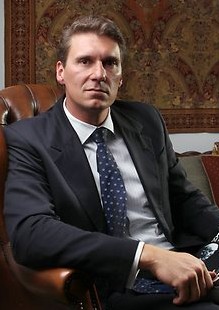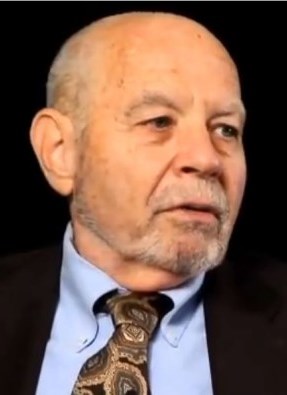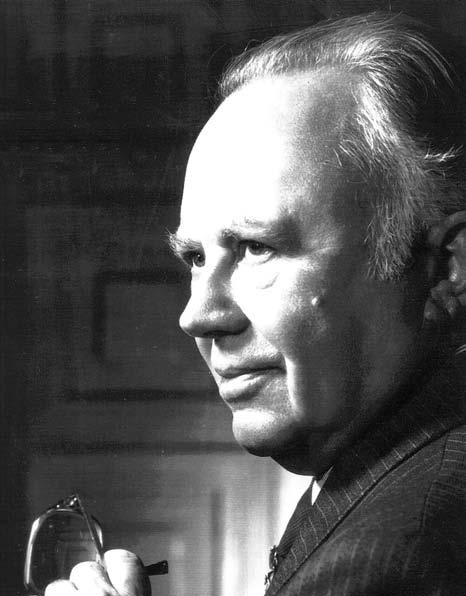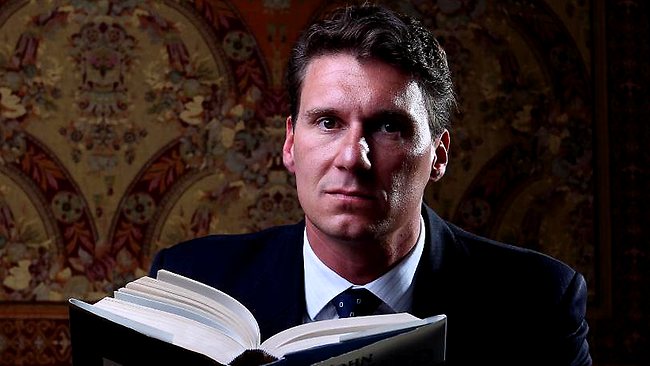Don’t Mention the War!
Conservatives’ Forgotten Role
The Paleoconservative or Traditionalist is a lonely soul.1 They often feel displaced, going about their business in a dissociative state. They are grateful to meet confreres and weep about the state of modernity, huddled in the corner of an obscure pub decorated with some vestige of “the good old days”. As Billy Joel sang “Yes, they’re sharing a drink they call loneliness, but it’s better than drinking alone”.

Prime Minister Malcolm Turnbull
The political captains of modernity – including the “conservative” ones – find such quaint figures amusing. Hopefully (they think) they’ll soon die off, and give up any hope of genuine political participation because their ideas are quite simply – archeology. The current use of the word “conservative” in Australia therefore precludes the Traditionalist.2 Management is content to have assorted right-liberals masquerade as “conservatives”, the deracinated notions peddled by them allow any sincere application of traditionalist principles to be discredited as “extremism.”
The shift in leadership in Australia pealed the death knell for Paleoconservatism in this country. The new Prime Minister, Malcolm Turnbull made a direct, pointed, ideological statement to his Party, his nation, indeed the world when he said (emphasis added):
“This will be a thoroughly liberal government. It will be a thoroughly liberal government committed to freedom, the individual and the market.”
After a short term as Prime Minister the outgoing denouement of Traditionalism in Australian politics, Tony Abbott, was allowed to watch the gravestone of his alleged (yet seldom practised) creed enclose upon it’s tomb. Rest assured, Mr Turnbull will place a dutiful soldier on watch. After all, if John Howard was “Lazarus with a triple by-pass”3 one isn’t sure what to expect of Mr Abbott (although the only miracle worker feeding the five thousand seems to be that pesky Senator Bernardi).

Sen. Cory Bernardi
And so the Traditionalists, like the shaken soul in Sunday Morning Coming Down, wake up to a new morning “with no way to hold (their) head that didn’t hurt … and stumbled down the stairs to meet the day.” However, sometimes it takes a crisis. People have to be shaken from their comfort zones and must hit rock bottom before they reassess the fundamentals of their beliefs. At the very least one might experience a moment of clarity. As the great Kris Kristofferson continues through the intoxicating voice of Johnny Cash “caught the smell of someone frying chicken. And Lord, it took me back to something that I’d lost somewhere, somehow along the way.”
The present shift in Liberal Party leadership represents a great opportunity for Paleoconservatives and Traditionalists of similar ilk, to capture the hearts and minds of those who have had that moment of clarity and wonder what happened to the world they thought they were preserving – what went wrong? They may feel disturbed, inarticulate and confused, but that is all the more reason why a steady voice of Tradition may offer the most soothing balm. Sure, it may take a true crisis for some people to stop somnambulating along with the liberal agenda.
It may take Portia Hornbucket-Webb to be rejected from every job interview despite her $100,000 private school education, her parent’s mansion to be sold to foreign buyers to cover nursing care costs, while dear Portia struggles to find a unit not festering with concrete cancer in one of the ethnic ghettoes in South-West Sydney. It may take that profound moment, as the last generation of well-fed Anglo-establishment gasps in the hospital bed, somewhat like Alec Guiness in The Bridge on the River Kwai: “what have I done?” No matter how it comes about, the liberal enterprise must either fail as unsustainable or totally transform the nation into something utterly unrecognisable and downright dystopic to the majority of its current establishment. At such time the Traditionalist will feel especially appreciated.
For the Paleoconservative, the primary space for expression will be in culture and its institutions, not in electoral politics.4 If it is ever to have a genuine political expression, it must come organically. There has been some talk of the possible founding of an explicitly conservative party in Australia.5 However an artificially constructed “Conservative Party” to pick up the disaffected traditionalist leaning electorate would ultimately be doomed to fail. It would truly be a castle built upon sand. The current political system in Australia simply doesn’t allow for new political movements to spring up overnight and achieve wide electoral success.

T. S. Eliot (1888 to 1965)
Even then, there’s a second problem. What if a conservative Party were to be magically granted a government by the voting public? How does one even begin to implement a true conservative agenda and maintain the reins of power for any more than a brief period of time? Besides, how much of a true conservative programme actually requires control of the government to implement it? The liberal mind-set is near all-pervasive and governments are responsive only to pressure groups and the whimsy of the poll.
One of the most entrenched problems in the mind of so-called “conservatives” is the insatiable desire for immediate political power. It is constantly touted as the only thing that matters. The mantra is recited that, without the actual power of being in government, all is for naught. This theory is of course self-evidently false, and notorious peddled by the most careerist of Party apparatchiks. It has been proven false by history to start with – the number of “conservative putsches” supposed to have ensured “true conservative victory” that have been nothing more than a continuation of the liberal agenda, are beyond count. Such conservatives sound like socialists – you know the type – socialism hasn’t failed, we just haven’t experienced “real” socialism. The problem is that in order to appear “appealing” to an electorate presumed to be thoroughly brainwashed with liberalism, the cunning “conservative” adopts liberal clothing with the pragmatic aim of getting into office. The problem is, especially having stoked the fires of liberalism with a conservative voice – the conditions never arise in which the “conservative” can actually drop the garb and express himself as what he professes to be (deep down, at least allegedly). This is where we start hearing the logic of “it is better to have 10% of something than 100% of nothing” and unbelievers are harshly criticised for their lack of pragmatism.
However, this 10% of something (or 20%, I have even heard 80%) turns out to be not much at all. The window dressing achieved by Tony Abbott: restoring knighthoods, negating the “multiculturalism” ministry, and absorbing the ministry for women into the Prime Minister’s role – has all been swept aside by Malcom Turnbull in a single week. The lasting monument to Tony Abbott’s existence is yet to be seen. Perhaps a plebiscite on the question of the definition of marriage? We can expect even this false token of stability will be manipulated by the Turnbull camp in due course. Certainly no physical landmark – how interesting that an alleged Traditionalist Prime Minister has left us without at least one cultural edifice or artwork reminding us of who we are.6

Prof. Paul Edward Gottfried
The harsh truth of the matter is that conservatives – pace Paleos and other notable exceptions7 – have been intellectually outgunned in the pursuit of building the political zeitgeist and largely became the liberals that they set out to differentiate themselves from. The various ideologies often referred to as “the left” have invested a lot in their intellectual tradition. There have been thousands of volumes of journal articles and tens of thousands of books written discussing the nuances of various “leftist” positions. Obviously such writings are most widely read in the hallowed halls of academia, but they are distilled in various forms – simpler and simpler – until finally, even the uneducated and illiterate have a mantra they can repeat that (for their needs) justifies their political prejudices. Not so for the conservative. Any conservative choosing to invest his time in the culture wars (declared over by the triumphant Turnbull) is accused of wasting his time and distracting the “real” conservatives from their prime focus of taking over the Liberal Party for the 17th time, or busily trying to save the economy with the best ideas liberalism can provide.
Of late, we have even seen a very bizarre and misguided form of “fusionism” emanating from the Liberal Party. The American fusionism of past decades (of which the stalwarts of modern Australian “establishment conservatism” are evidently ignorant of) was largely geared up to fight the threat of Communism, and was an attempted alliance of distinct schools who knew they were different. In contrast, the “fusionism” espoused by the nominal-right of today is one of attempting to unite mutually incompatible ideas in the one “philosophy.” The loosely labelled “ideas” of “liberal economics” and “social conservatism” are yoked together like cat and dog – neither being understood or explained particularly well. This reeks of political convenience. It is a failed attempt to justify pragmatism in intellectual terms; unfortunately, it appears to work on a completely somatised audience. The recent leadership spill however is waking people up.8

Thomas Molnar (1921 to 2010)
“Conservatives” who espouse the views above are tragically unaware of the progressive assumption implicit in those view. The progressive at heart believes in a material existence and seeks fulfilment in mundane terms. However, the perfection of mankind is to be achieved in immanent, intramundane redemption.9 When the “conservative” demands of his brothers an immediate, mundane profit for the investment of one’s time – they are essentially adopting the progressive mind-set. Having said that, the clever progressives, whilst still seeking earthly perfection, note the writings of Antonio Gramsci and realise that conquering the institutions of society is far more valuable than getting embroiled in the tit-for-tat slog of party politics at the ballot box. This realisation has given rise to a very successful programme of long term revolution. The sans-culottes no longer storm the Bastille. Despite not bringing immediate reward, the simmering but more thorough revolution that constitutes the slow march through the institutions, has been a magnificent triumph. Every aspect of the arts, education, bureaucracy, policy formation and even religion has been thoroughly infiltrated by progressive beliefs. The conquering of the political realm has become a natural corollary.
Yet, conservatives seem to be unwilling to accept or even understand this – or perhaps they are lead by the extremely obtuse. It really doesn’t matter who is in political power now – the agenda is only going in one direction, there is only a contest of management.10 Sure, having a dedicated Paleoconservative thrust into government would make a difference in some way, but when you look at the harsh reality of the situation it really does sound like adolescent fantasy to engage in thoughts of conservatives storming home in electoral coups. The conservative however, has acquired a form of political ADD: where he cannot even stand still let alone look to the past for inspiration; after all “there’s an election to be won.” As the band Cake reminds us in Comfort Eagle: “Now today is tomorrow, and tomorrow today … We are building a religion, we are making a brand, we’re the only ones to turn to when your castles turn to sand.”

Enoch Powell (1912 to 1998)
Even the “natural conservative” identified by Russell Kirk in his Politics of Prudence11 has been so thoroughly indoctrinated with the liberal worldview that he is estranged from his own instincts. Anyone talking about inequality and particularism could be a dangerous “bigot” – so then shut them down and purge yourself of all those ideas. The Paleo is labelled a heretic and a traitor, despite the fact that as Enoch Powell reminds us – Judas was paid.12
This thorough liberalising is due to the success of the left in the Culture War. It is in that war where a Traditionalist could be most effective. The self-professed conservative “elite” in Australia however, has no grasp of culture – highbrow or lowbrow. They have no “brow.” The acephalic economists13 who dictate to conservatives what “clever” people do, have never armed natural conservatives with the weapons required to fightback and reclaim the institutions. Of course, having control of government allows one to have some impact upon the Culture Wars, but the impact would be akin to airstrikes in what is really a guerrilla ground war. The problem is that the establishment conservatism pays virtually no heed to the Culture Wars, so the enemy always has its network of underground tunnels to retreat to – i.e. the ideological and meta political narratives that underpin all those cultural institutions taken over as a result of Gramsci’s “long march.”
The conservative has at his fingertips an incredible intellectual pedigree. The conservative is disposed to a certain approach to the totality of life – not just the mere day-to-day vicissitudes of political life. The conservative has a stunning array of materials to draw from: philosophy from Aristotle to Heidegger, literature from Dostoyevsky to Henry James, poetry from Wordsworth to Eliot, music from Thomas Tomkins to Anton Bruckner, art from William Hogarth to Kenneth Clark – the architecture of Léon Krier, food, sport, fashion, games, science, economics, popular culture – the conservative mind is an all-encompassing world view. The great minds that have contributed to the conservative canon: Russell Kirk, Thomas Molnar, Eric Voegelin, Richard Weaver, Allen Tate, Mel Bradford – to name but a few, are seldom spoken of in “conservative” circles because they are simply unknown.14 The answer to many a conservative’s question and the counter-proposition to the Cultural Marxist, are all out there to be discovered. Yet, the conservative is dulled by his own “elite” and leadership class. Careerism, fear, opportunism and ignorance – these four apocalyptic horsemen drive the conservative chariot into the desert as opposed to hauling the sun across the sky.

Russell Kirk (1918 to 1994)
It is not enough however to simply make contact with the intellectual heritage. Whilst one hopes that “redeeming the time”15 will be the relatively simple exercise propounded by Kirk in his later works, unfortunately it won’t be. A particular adjustment in attitude is required. It is not enough for the conservative to simply “be” anymore because he is at war – a very deliberate and profound war. In modern times, the conservative must accept the fact that we have reached the “Bradford Imperative”16 and reaction is necessary. Mel Bradford pondered the necessity of reaction, “Reaction” is a necessary term in the intellectual context we inhabit late in the 20th Century because “merely to conserve is sometimes to perpetuate what is outrageous.”17 He has truly been vindicated by the passage of history. The problem is, the Bastille has been stormed, the guillotine is out – it just happened in slow motion. To fail to recognise the nature of “progression” and “revolution” is a fatal mistake leading to an existential crisis for conservatives. The progressive now adopts the guise of “evolutionary” change whilst being, in fact and substance, a completely planned revolutionary act. More fool the conservative who prefers the security of the moment and the goal of tomorrow’s election to recognition of the battle required to defend principle – to cease the perpetuation of the outrageous.
The final act for any self-respecting Paleoconservative – regardless of whether those who label themselves as conservatives are willing to shout him a drink at the bar or not – is to have his “I am Spartacus” moment where he no longer denies himself or his fellow Paleos when they are being downtrodden. The maxim corvus oculum corvi non eruit18 should be heard as management launches its attacks upon the field of now standing Spartici gearing up for a fight.
Only when conservatives are prepared to abide by their creed and look at what has gone before to guide them in their future, will they have a hope of a genuine and lasting sense of regeneration. Their progressive enemies over the last decades have engaged in a guerrilla war through the institutions – it’s about time conservatives were content to launch their own, even if it is only their children who reap the rewards.
– Luke Torrisi is a retired legal practitioner and now an academic researcher and host of Carpe Diem, Sydney’s only explicitly Traditionalist and Paleoconservative radio programme broadcasting on 88.9FM, between 8:00 to 10:00pm, Mondays.
- Here, I do not intend to explain the nuances of Conservatism, nor do I wish to suggest a neat separation between Paleoconservatives as “true” Conservatives versus “the imposters.” Such a conveniently neat line could never seriously be drawn. The term “Paleoconservative” (coined by Prof. Paul Gottfried of Elizabethtown College, Pennsylvania) is really a distinction from “Neoconservative”, hence my qualification of “or Traditionalists.” The point of this presentation is to suggest that the term “Conservative” has been hijacked with a view to excluding Paleoconservatives and Traditionalists from the political discourse of what could be described, for lack of a better term: the official non-left. In that sense they are distinguished from what have become known by the crude pejorative of the “cuckservative” in contemporary reactionary and “Dissident Right” thought (the term have even begun to increasingly penetrate mainstream political discourse: see for example, the commentary of Charles C Johnson, “Refugee from Cuckservatism” Taki’s Magazine (31 July 2015) <takimag.com> (accessed 8 October 2015). [SydneyTrads Editors: for a brief history of paleoconservatism, see Prof. Gottfried’s contribution to this Symposium: “Paleoconservatism: A Vanishing Traditional Right” SydneyTrads (17 October 2015) <sydneytrads.com> (accessed 17 October 2015)]
- For a broader discussion on the notion of the hijacking of the term “Conservatism” see: Paul Gottfried and Thomas Fleming, The Conservative Movement (New York: Twayne, 1988); James Caesar, “Four Heads and One Heart: The Modern Conservative Movement” The Future of Conservatism W. Dunn (ed.) (Wilmington: ISI, 2007); Sam Francis, Beautiful Losers – Essays on the Failure of American Conservatism (Columbia: University of Missouri, 1993); Russel Kirk, The Politics of Prudence (Wilmington: ISI, 1993).
- The term was used by former Prime Minister John Howard to describe his turbulent political career. See further: Mungo MacCallum, “Howard’s Politics” Robert Mann (ed.) The Howard Years (Black Inc., 2004) p. 58.
- For a more complete understanding of this point see the opening chapter of Russel Kirk, The Conservative Mind from Burke to Eliot (Washington: Regnery, 1995).
- This was most recently mentioned in a report by Max Opray, “Rallying the Right” The Saturday Paper (3-9 October 2015) p. 3.
- For an explanation of the importance of such things, see the opening remarks (particularly his citation of Ruskin) in Chapter One “The Skin of Our Teeth” in Kenneth Clark, Civilisation (London: Penguin, 1987).
- An example of a good attempt to deal with intellectual issues of greater significance in the Australian context is Cory Bernardi, The Conservative Revolution (Ballarat: Connor Court, 2013). For a recent review of this volume, see: Edwin Dyga, “Principled Leadership in the Age of Opportunism: An Australian Perspective” Humanitas Volume 27 Nos. 1-2 (2014).
- An appropriately scathing critique can be found in Michael Warren Davis, “When It’s Party vs Principle” Quadrant Online (8 October 2015) <quadrant.org.au> (accessed 8 October 2015).
- For a fuller explanation of this view see Thomas Molnar, Utopia: The Perennial Heresy (New York: Sheed and Ward, 1967).
- For an interesting albeit very pessimistic perspective on this for the future of Conservatism, see John Gray, Black Mass (London: Penguin, 2007).
- Supra n. 2.
- In a speech after calling for his supporters to vote for the Labor Party made on 25 February 1974 at Shipley, Enoch Powell said in response to a heckler calling out “Judas!” – “Judas was paid! Judas was paid! I am making a sacrifice!”
- For a grasp of the Paleoconservative position on contemporary economics see Matthew Crawford, Shop Class as Soulcraft (New York: Penguin, 2009). [SydneyTrads Editors: the UK edition of this work was republished as The Case for Working with your Hands – or Why Office Work is Bad for Us and Fixing Things Feels Good (London: Viking, 2010)].
- I frequently ask self-described conservatives who deride Paleos to name a conservative thinker, and pitifully, they cannot. At best they prattle off the names of former Liberal party politicians who have written memoirs. In a fit of desperation you may find some nominating Edmund Burke, but soon find that their entire experience of him is derived from Wikipaedia. One seldom finds the same response from any kind of “leftist” – even the “looney” ones.
- See Russel Kirk, Redeeming The Time (Wilmington: ISI, 2006). This concept has deeper roots to be found in T.S. Eliot as well as Scripture, which Kirk explores in great depth in Eliot and His Age (New York: Random House, 1971). For a profound study of the spirituality of T.S. Eliot see Barry Spurr, ‘Anglo-Catholic in Religion’: T.S. Eliot and Christianity (Cambridge: The Lutterworth Press, 2010).
- The term I use to denote the situation when the institutions have become so infiltrated by liberalism that to support them in substance (but perhaps not in form viz. institutions such the Monarchy or the Common Law that retain their important outward function, but are filled by individuals with no apparent concern for Tradition) is no longer a mark of the conservative disposition.
- M. E. Bradford, The Reactionary Imperative (Peru: Sherwood Sugden & Co., 1990).
- “A crow will not pluck the eye of a fellow crow.”
Citation Style:
This article is to be cited according to the following convention:
Luke Torrisi, “Don’t Mention the War! Conservatism’s Forgotten Role” SydneyTrads – Weblog of the Sydney Traditionalist Forum (17 October 2015) <sydneytrads.com/2015/10/17/2015-symposium-luke-torrisi> (accessed [date]).






Be the first to comment on "2015 Symposium – Luke Torrisi"